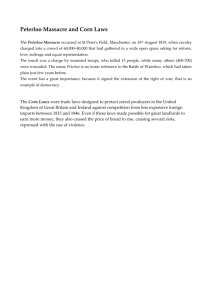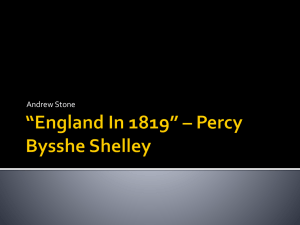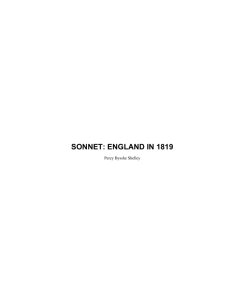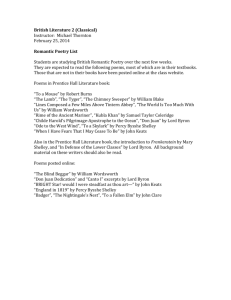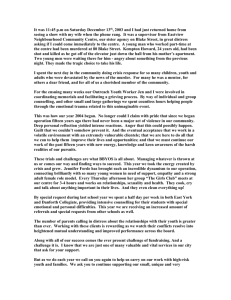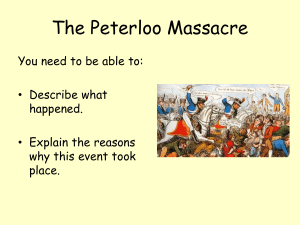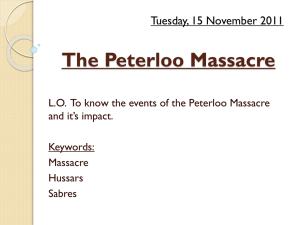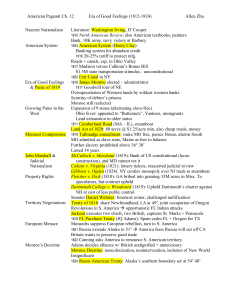"London" by William Blake "England in 1819" by Percy
advertisement
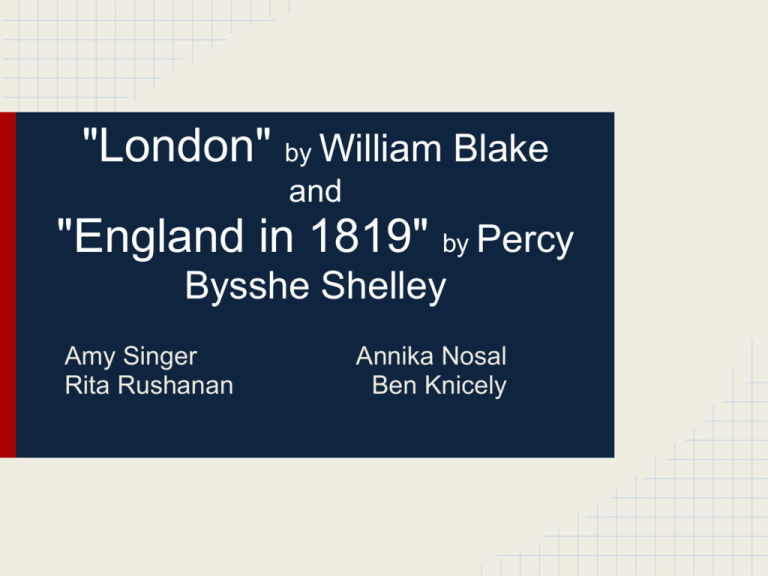
"London" by William Blake and "England in 1819" by Percy Bysshe Shelley Amy Singer Rita Rushanan Annika Nosal Ben Knicely William Blake ● Lived 1757 - 1827 ● Born in London, England ● Wrote "London," published in 1794 ● Invented relief etching to illustrate his written works ● Participated in a number of riots and protests against issues such as taxing and oppression by the church and state ● Associated with several other radical political thinkers, such as Thomas Paine William Blake's Art Blake often used his etchings to illustrate the overarching theme that grouped together the works he published inside Western Europe in 1794 ● The French Revolution ○ ○ ○ ● England is at war with Revolutionary France ○ ● overthrowing the absolute monarchy liberty and universal rights radical political and social ideologies attempt to reestablish monarchy and contain the revolution Radicals in England are demanding reforms ○ ○ ○ improved representation in Parliament more democratic system of government universal suffrage "London" Lists the effects the problems in England have on the people of London. ● Blames are placed on the church and the monarchy (Lines 912). ○ The recklessness of the government during the wars were costing lives of soldiers. ○ The church was meant to help and protect people, but has been failing. (chimney sweeps) ● "mind-forged manacles" ○ Blake believes that focusing entirely on the self and one's own interests creates a mental prison. ○ The juxtaposition of the "charter'd streets" and the "charter'd thames" suggests the nature of London during this time, where even the river Thames was owned. ● Percy Bysshe Shelley ● Lived 1792 - 1822 ● Born in Horsham in West Sussex country, England ● Wrote "England in 1819" in 1819, published in 1839 ● Radical political and social views ○ atheist ○ vegetarian ○ idealist and anarchist: civil disobedience ● Wed Mary Shelley in 1816 The Peterloo Massacre ● ● ● After the Napoleonic Wars, starvation and economic strife was rampant in England. In 1819, many adopted political radicalism. A meeting of around 70,000 individuals was organized in St. Peter's Field. ○ ○ ○ ● voter reforms: universal suffrage, ballots, etc. anti-Corn Laws representation of industrialists and manufacturers in Parliament A cavalry charged the crowds, killing 11 and injuring 400. Shelley's Ideals in Poetry ● Romanticism emphasizes the individual ○ anarchy --> self-government, solitude ● "The Masque of Anarchy" written in response to the Peterloo Massacre ○ the poem calls for nonviolent resistance (civil disobedience, peaceful protests) ● "England in 1819" ○ "A people starv'd and stabb'd in the untilled field" reference to the massacre ○ describes the king as "old, mad, blind, despis'd, and dying" "England in 1819" ● Like "London," it is essentially a poetic list of the problems existing in England in 1819. ● It places the blame on a corrupt and overbearing government. ○ ○ ○ ○ ○ The monarchy/government has become detached from the struggles of the people beneath it, and England's rulers are like leeches on society. "Blind in blood" is an extension of the leech metaphor that suggets the "leeches" (Who neither "see, feel, know") abuse their power until the people are starved. "Without a blow" is foreshadowing the next line of the "two edged sword", because the "blow" in line 6 describes the slow sucking effect the leeches have on the people, but the massacre, relative to the leech, is a quick blow rather than a slow death. Shelley criticizes using the army against the people (such as in the Peterloo massacre) and describes the suppression of liberty as a "twoedged sword." The "glorious Phantom" in the final lines likely represents the ideals of Romanticism, which Shelley hopes will someday enlighten England. Discussion Questions ● ● ● ● tic o x E Why do you think Romantic were The Emotion poets interested in politics? Spirit-In -Nature How do nationalistic views come across in these two poems? The Irrational What do you know about the l a r u t a n r Supe e h T history of the time period that may Subjectivity have contributed to these poems? What differences are there The Individual between Blake's and Shelley's Esca pism styles? Sources ● ● http://www.poets.org/poet.php/prmPID/116
